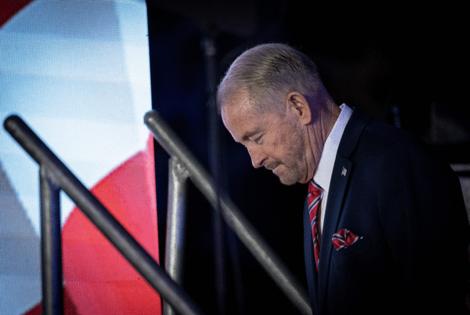Mexico's 'cool-head' Trump approach tested by new tariff threat
Published in News & Features
Mexican officials were taken aback by President Donald Trump’s latest tariff threat after paying frequent visits to his top aides in Washington to convince him their efforts to fight drug trafficking were paying off.
For months, U.S. officials have been effusive about Mexican cooperation on issues related to the border and security. “Very responsive,” raved Secretary of State Marco Rubio. “Positive momentum,” Treasury Secretary Scott Bessent called it.
On Saturday, Trump blasted the country’s response in a letter threatening 30% tariffs. “What Mexico has done is not enough,” he wrote. “Mexico still has not stopped the Cartels.”
Mexican President Claudia Sheinbaum called for the country to keep “a cool head,” but a sense of exasperation swept over people involved in the U.S. negotiations, according to people familiar with the talks. Their cordial approach suddenly seemed to have yielded little — for now.
The neighboring nation is looking to persuade Trump that Mexico and the U.S. are complementary economies, and that Mexico is willing to cooperate against cartels in unprecedented ways, added the people, who asked for anonymity to discuss internal deliberations.
Trump’s threat of a 30% rate, with exceptions for products certified under the trilateral trade agreement between the two countries and Canada, is unlikely to drastically move the needle beyond the 25% rate already in place, according to Bloomberg Economics. Nearly 83% of U.S. imports from Mexico were exempt from tariffs in May, mainly due to exemptions on USMCA-compliant goods.
But Trump’s 30% threat isn’t much better than the 35% rate he announced for Canada, which has taken a much more confrontational tone with Trump while Mexico played nice.
Some U.S. officials tried to suggest cooperation could continue despite the letter.
U.S. Ambassador to Mexico Ronald Johnson said Saturday in Mexico City that Sheinbaum and Trump have a “wonderful relationship” and no partnership should be easier than between their two countries. “America First doesn’t mean America alone. In fact, I’m here in Mexico with my arms open in friendship with a message of true respect for the sovereignty of Mexico,” he said at a tuxedo-filled gala thrown in his honor and attended by many from Mexico’s political, business and media elite.
Sector-specific tariffs, including on steel and soon on copper, had given Mexico in recent weeks reasons to appeal to Trump’s officials for a fairer deal as it seeks to protect its position as the U.S.’s top trade partner in the world. It had shielded part of its export industry by negotiating to have a previously announced auto duty limited to the non-U.S. portion of cars.
“Mexican authorities will likely continue to engage constructively with the U.S. administration, on border control and to some extent also by hardening the stance against the drug cartels and the flow of fentanyl into the U.S., in order to preserve access to the U.S. market under competitive conditions,” wrote Alberto Ramos, head of Latin American economics at Goldman Sachs Group Inc., in a note.
Mexico’s peace offerings have included the extradition of dozens of high-profile detainees involved in the drug trade, and an increase in busts along drug routes. Its security minister has been one of the visitors in the Washington talks, and on the domestic front the government has pushed for legislation to increase investigations of unsolved crimes.
But ties have also been strained in recent weeks by the U.S. announcement of a move to cut off three Mexican financial firms over potential involvement in money laundering for drug cartels.
For now, Mexico is staying the course. The Economy Ministry said in a statement on Saturday that Minister Marcelo Ebrard had been in Washington since Friday for negotiations with the White House, the U.S. Trade Representative and the Commerce Department, and that Mexico would defend its interests. The ministry called Trump’s proposed tariff increase, to take effect Aug. 1, “unfair.”
Mexico will work to find “an alternative that allows us to protect businesses and jobs on both sides of the border,” the ministry said.
©2025 Bloomberg L.P. Visit bloomberg.com. Distributed by Tribune Content Agency, LLC.







Comments